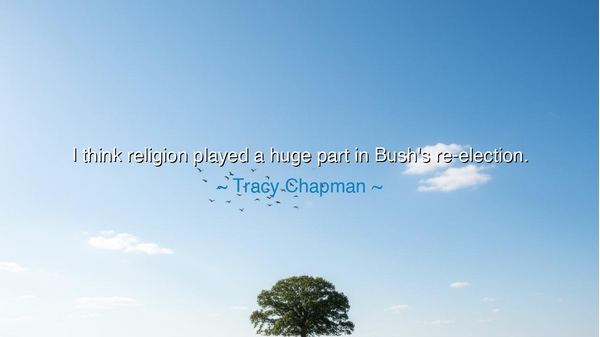
I think religion played a huge part in Bush's re-election.






“I think religion played a huge part in Bush’s re-election.” – Tracy Chapman
In this simple yet potent observation, Tracy Chapman, the voice of conscience and quiet revolution, speaks to a truth as old as civilization itself—that faith, when entwined with power, can move nations. Her words are not uttered in anger, but in reflection, as one who has seen the immense force of belief shaping the destiny of peoples. When she said that religion played a huge part in Bush’s re-election, she was not merely speaking of politics; she was pointing to the deep and ancient relationship between the human heart’s yearning for the divine and its need for leadership. For throughout history, rulers and prophets have vied not only for the minds of men, but for their souls.
The time in which Chapman spoke was the early twenty-first century, when the world trembled between fear and faith. In the shadow of tragedy and war, America turned inward, seeking moral certainty amid chaos. George W. Bush, a man who openly declared his Christian conviction, stood before the people as a figure of strength and divine assurance. To many, he appeared chosen by Providence to protect the nation in an age of uncertainty. In such moments, religion becomes not only belief, but banner—a language through which hope, fear, and duty intertwine. Chapman, ever the observer of the human condition, saw how faith can both unite and divide, inspire and entangle, elevate and manipulate.
The ancients, too, knew this dual nature of faith. The Pharaohs of Egypt ruled not as men but as gods upon the earth; the kings of Israel claimed the right to reign through divine covenant; and the Roman emperors, crowned with laurel, demanded not just allegiance, but worship. Religion, when joined to power, becomes a river of immense strength—able to nurture the people or to flood and drown them in zeal. Chapman’s words echo this ancient truth: that belief, when used to sway hearts in times of fear, can decide not only elections but the course of history itself.
Consider, for example, the reign of Constantine the Great, who in the early fourth century bound the empire to Christianity. His conversion, whether born of vision or calculation, changed the destiny of the Western world. Faith became empire; empire became faith. For centuries thereafter, the cross and the crown walked hand in hand, each strengthening the other. So too, in modern times, Chapman perceived that religious identity had once again become a pillar upon which political power stood—proof that even in an age of reason, the ancient fires of faith still govern human hearts.
Yet her words carry not cynicism, but a deeper wisdom. She reminds us that religion, though capable of power, was never meant to be an instrument of domination. Its true purpose is not to win elections, but to awaken compassion; not to bind men under creeds, but to open their hearts to the sacred. When belief becomes a weapon or a slogan, its light dims, and it serves not the divine, but ambition. The huge part that religion played, Chapman suggests, is both a revelation and a warning—that when the sacred is drawn into the marketplace of power, it risks losing its purity.
Let the listener, then, take heed: faith is a force to be honored, not wielded. If religion moves you, let it move you toward justice and love, not toward the conquest of others. Let your belief be a fire that warms, not burns. Seek leaders not because they claim divine favor, but because they embody divine compassion. For the true measure of faith is not in the banners we wave, but in the mercy we live.
And so, Tracy Chapman’s quiet reflection stands as both mirror and message. She reminds us that in every age, the sacred and the worldly will meet—and in that meeting lies our greatest test. Will we use faith to rise above fear, or to justify it? Will we honor the divine through truth, or through power? The lesson is clear: religion must serve love, or it serves nothing. To walk wisely in this world, one must guard the heart against those who would claim heaven’s name to rule the earth. For only when faith is free from ambition can it lead mankind, not to victory, but to peace.






AAdministratorAdministrator
Welcome, honored guests. Please leave a comment, we will respond soon